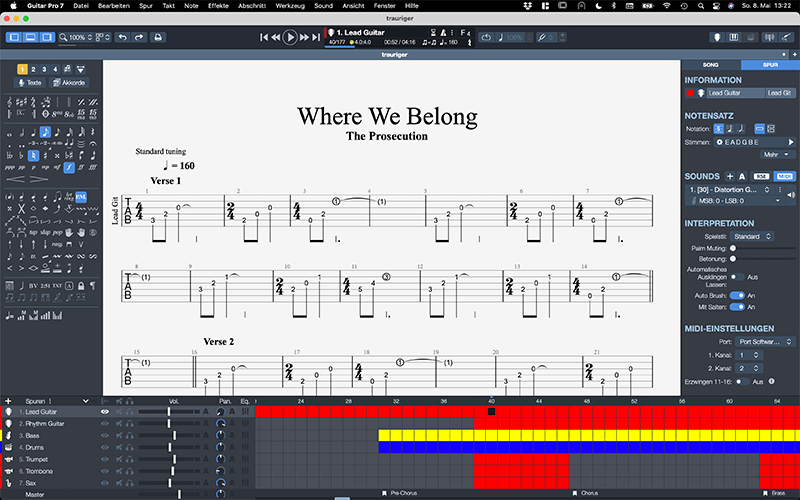The Ultimate Pre-Production Guide
In this guide, you will learn:
- What is a pre-production?
- Forms of pre-production
- Advantages of pre-production
- When is pre-production useful?
- 3 Examples – Comparing pre-production and production
What Is a Pre-Production?
Put simply, pre-production is a somewhat less time-consuming and less elaborate version of a full production. That means all the essential elements of a song are captured in a pre-production, but the focus lies primarily on the parts that define the song. The performance doesn’t have to be 100% accurate, unlike what’s aimed for in the “real” production.
Ultimately, the goal is to capture the core idea, energy, and mood of a song in order to make the producer’s job in the studio easier and to create a solid communication base between you and the producer.
Pre-production can be a very simple summary of musical parameters and content (lyrics, chord progressions, tempo, arrangement). But it can also be a time-intensive process that gradually transitions into full production. Let’s take a look at the most common forms of pre-production and what equipment you’ll need for each.
Forms of Pre-Production
There are different forms of pre-productions. You will learn the difference between the most common ones:
- Demo Recording
- Demo recording with overdubs
- Programmed Drums with Overdubs
- Notation and MIDI-Pre-Production
1. Demo Recording
A simple live recording from the rehearsal room – as simple as that!
Required equipment:
Your smartphone and a recording app are absolutely sufficient.
Ideally, use an app that allows you to control input levels to avoid distortion.
I use the built-in voice-memory function of my iPhone – free, simple, and totally adequate.
If you want a more professional and cleaner sound and have a small budget, a Zoom recorder is an affordable option.
Bonus: The Zoom recorder can also be used as an interface with your computer! But if you plan to work with an interface I suggest to go with something at least semi-professional like the Focusrite Scarlett Interfaces.
2. Demo Recording with Overdubs
This is quite similar to the first version. However, you focus initially only on the instrumental parts and leave out elements like vocals or solos. Play the song as many times as needed until you’re satisfied. Then, record the missing parts over the existing demo – this is called “overdubbing.”
The result sounds cleaner and more transparent, and you have more control over levels between vocals, solos, and the rest of the track. You can also add effects like reverb or delay to the vocals or solos to blend the tracks more naturally or highlight a particular sound aesthetic.
Required equipment:
I recommend an Scarlett interface by Focusrite – they come with different numbers of inputs and outputs.
Record the base demo directly via your phone (or as mentioned before a Zoom recorider), or record it into your DAW – a what?.
You’ll also need a DAW (Digital Audio Workstation – e.g., Logic Pro X, Cubase, Ableton, etc.) to record the additional parts with an external microphone.
4. Notation and MIDI Pre-Production
If you’re a composer and songwriter who writes for full arrangements, notation software is a great choice. Most of these programs also allow you to export the entire song or individual instruments as MP3 files, which helps you hear what’s written in addition to seeing the notation.
You can also export tracks as MIDI files, import them into your DAW, and use them to trigger other sounds.
Required equipment:
I use Guitar Pro for notation. Many DAWs now have built-in notation tools, but I still prefer Guitar Pro – I’m deeply in love with its MIDI sound and still remember all the instrument numbers by heart (Guitar Pro users before version 5 will know what I mean).
So those are the most common forms of pre-production. Now let’s look at the benefits of investing time and money into pre-production.
Advantages of Pre-Production
You might rightfully ask:
“A production and a professional producer already cost a lot of time and money – why invest even more, if I’m already putting so much into my music?”
There are many good reasons. Here are a few:
1. Pre-Productions Save Time and Money
In fact, you’re more likely to save a lot of time if you invest in a solid pre-production. The required equipment is a one-time investment that you can reuse for future songs and projects.
If you reach a good level of doing solid pre-productions you can also actually save some money. I work with a few artists, who are at a decent level of pre-producing there songs. They are good enough that we can use some tracks for the final production. That makes it a lot easier and faster to come to a professional results – and therefore you can calculate less costs for the production service.
2. You Learn to Understand the Work of a Producer
By choosing to do a pre-production, you have to engage with recording techniques and, depending on the type, also basic mixing concepts. This helps you understand the producer’s work in the studio later on.
This way, the studio doesn’t feel like a “black box” where you have no clue what’s going on.
3. You Learn to Make Decisions
In pre-production, you have to make decisions. Do you play that guitar riff in this position or an octave lower? Should the backing vocal appear in every chorus or just the last one as a climax? Is the intro too long, or should you cut it entirely and go straight into the first verse?
There are thousands of options – and pre-production trains you to make clear choices. People often hesitate out of fear of doing something “wrong,” thinking the song has to be “perfect.” In my opinion, perfection is highly subjective and often gets in the way of creativity.
4. You Realize What Truly Matters in Your Song
Only the most essential elements should make it into the pre-production – those that are crucial to you, your song, and your artistic vision. Think of it as a condensed version of your song that clearly highlights what defines it.
5. You Understand Your Song Better
Parameters like tempo, key, arrangement, song length, and instrumentation become much clearer during pre-production. That helps you understand your own song on a deeper level and might even reveal strengths you can enhance later. Weaknesses can be addressed and eliminated early on.
6. You Practice Your Song (Without Actually Practicing)
Pre-producing means you’ll likely need to play or sing certain parts multiple times until you’re satisfied with the take. This acts as a natural form of practice. It pays off during the final production – and later on stage during live shows.
7. Guide Tracks
One very practical side effect of pre-production is having so-called guide tracks available for the recording sessions. Guide tracks are instruments or groups of instruments that help guide you through the recording and production process and keep everything on track.
This is especially helpful for overdub recordings. For example, drummers often find it challenging to record to a click track alone without the feel of the full band. Guide tracks provide structure and confidence.
So, When Is Pre-Production Really Worth It?
In my opinion, pre-production is almost always worthwhile – but it doesn’t have to be an elaborate process. Often, a simple phone recording from rehearsal is all you need. It depends on what you want from working with a producer and what vision you have for your songs.
If you’re mainly a lyricist and want help turning your ideas into full songs, a demo recording will usually suffice. That can even be done at the studio or on a remote session before the real work begins.
But if you’re in a band or have a very clear sound vision, it’s worth spending more time on pre-production. It will help producers implement your vision more accurately. In some cases, individual pre-production tracks can even be reused, refined, and enhanced.
3 Examples – Comparing Pre-Production and Final Production
Now I’d like to show you a few examples from my work as a producer, so you can get a better idea of the starting points and where they eventually led.
The Prosecution – Where We Belong
Background:
The Prosecution was my personal passion project for a long time. Until 2019, we toured all over Europe, playing more than 300 shows and releasing several albums. For the first few albums, I was the main songwriter and composer; later on, I also took over production duties.
I had a clear vision for the songs, and since we were an 8-piece band (drums, percussion, 2 guitars, bass, trombone, trumpet, saxophone, vocals), it was absolutely essential to have the songs thoroughly prepared before heading into the studio.
For a long time, we arranged and composed everything in Guitar Pro. Later on, we started doing more elaborate pre-productions, during which we also recorded vocals—partly because my interest in producing kept growing.
Screenshot Guitar Pro of the Song “Where We Belong” by The Prosecution:

Pre-Production:
Final Production:
Other Izzy – LYTG
Background:
Izzy is actual the singer of a event band. They play a lot of shows, but do mainly cover songs. Some songs are originally written by Izzy. For the song LYTG she was looking for a pop approach – so she decided to contact me. She send me the pre-production. In this case it was a rehearsal room recording of her and her band performing the song – a simply recording with the phone.
We took it from there and I produced the track step by step and finally the song was exactly what she was looking for: a modern pop song!
Pre-Production:
Final Production:
Kain von Beiden – Puzzleteile
Background:
Kain von Beiden has a small project studio at home and can create simple demos right at his own PC. He recorded a track of the guitar, so the harmonic structure was set. He also sung a track of vocals, so I could get an idea of the melodic structure and his vision of the basic idea.
In a call we talked about the genre and together we listened to several reference tracks he liked – so the direction was clear. Listen here to the pre-production compared to its final version:
Pre-Production:
Final Production:
Conclusion
By now, you might already have an idea of what type of pre-production makes sense for you and your musical project. But if you’re still unsure, feel free to get in touch with me. In a free consultation, we can figure out together what the best approach is for you.
